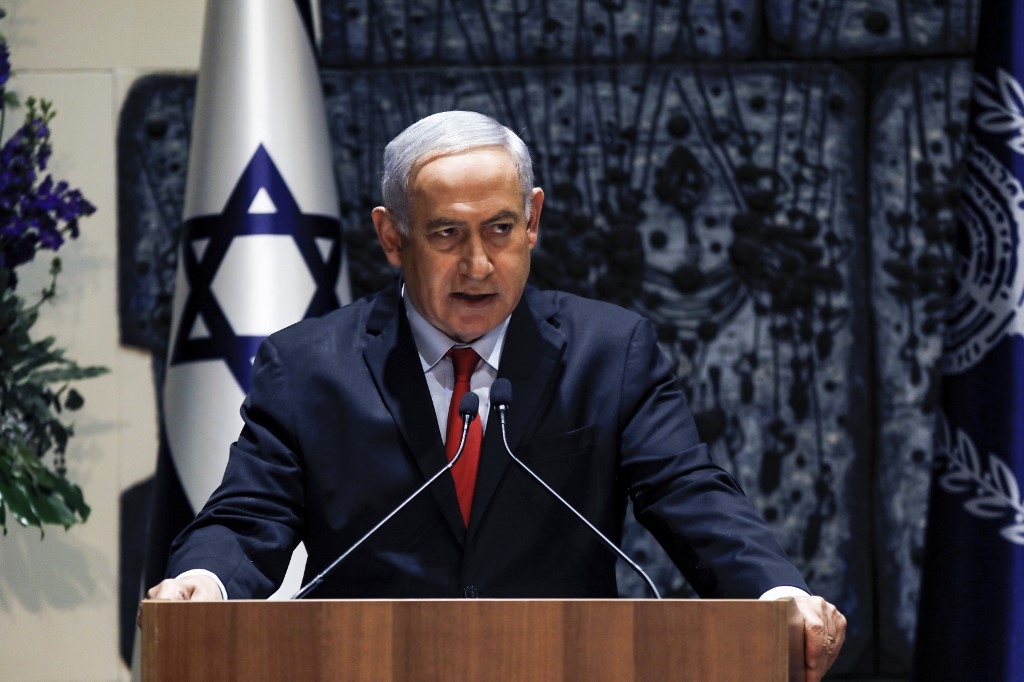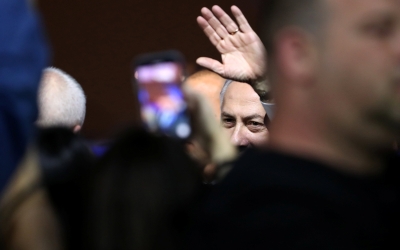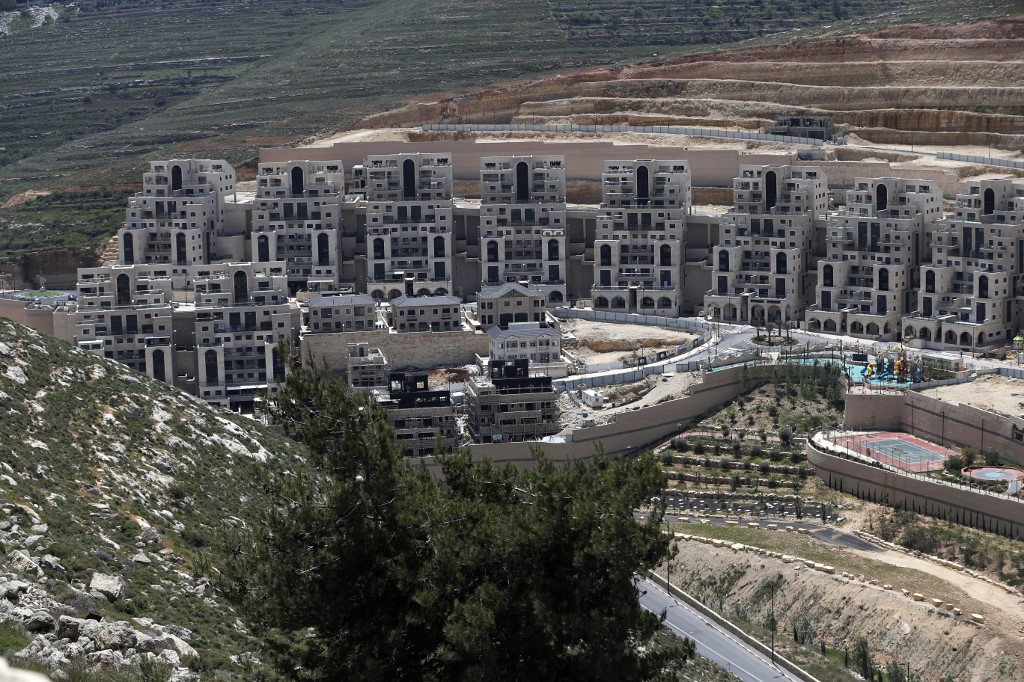Palestinians must resist Netanyahu's drive toward West Bank annexation

Israeli elections ended this month with a double victory for Prime Minister Benjamin Netanyahu: his party won 35 seats, five more than in the 2015 election, and his right-wing camp as a whole won 65 seats in the 120-member Knesset.
The religious right lost seven seats by failing to achieve 3.25 percent of all valid votes, which means that the practical power of the right is greater than the election results. Their strength within Jewish society represents an overwhelming and stable majority.
These results are a clear indicator of the extreme right’s domination of Israeli society. It sends the message that the Israeli political sector, and the public in general, are incapable of achieving the necessary maturity for a political settlement of any sort.
Internal Palestinian division
This is not about highlighting the elections, but about raising an issue of utmost gravity: Israel’s political community has not only shut the door to the possibility of finding a solution to the Palestinian conflict, but it is also moving towards unilateral measures to end it. The first of such steps will be annexing at least part of the West Bank.
New MEE newsletter: Jerusalem Dispatch
Sign up to get the latest insights and analysis on Israel-Palestine, alongside Turkey Unpacked and other MEE newsletters
Any real internal change within Israel will not happen without a movement on two fronts: Palestinian pressure, by activating a real popular struggle against the occupation; and international pressure, through crowds invested in the moral power of the Palestinian struggle for freedom against the longest-lasting occupation in the world.
In parallel, there must be real work to end internal Palestinian division. Netanyahu considers the preservation and entrenchment of this division to be a cornerstone of his quest to marginalise the Palestinian cause and the national movement. Likud leaders have repeatedly expressed their happiness over the continuing division; this, in itself, should be enough of a catalyst to swiftly bring the division to an end.
Israel aims to crush Palestinian aspirations, as seen through the catastrophic nation-state law. The response cannot merely be to end the division between Hamas and Fatah, and between Gaza and the West Bank; it must involve a movement encompassing all Palestinians - inside Israel, the West Bank and Gaza, and in the diaspora.
If Netanyahu wants to bring the conflict back to square one - a conflict over existence - then the Arab and Palestinian response must come under the framework of the inalienable and legitimate historical rights of the entire Palestinian people, and their popular united struggle.
The Al Capone of the Middle East
After his landslide victory, Netanyahu is setting out to protect his throne from the three cases of corruption that could ultimately result in his imprisonment.
Yet, these offences are quite lightweight in comparison with the major crimes he has committed against Palestinians, as his regime oversaw the massacre of thousands of Palestinians in the 2014 Gaza war and the Great March of Return rallies over the past year.
What kind of democracy gives a medal to those who kill thousands, while punishing them over gifts of champagne and cigars?
The Israeli system is based on mob mentality, whereby he who kills and destroys gains respect, but he who touches the gang’s money, or violates internal rules, is punished. In this way, the hypocrisy and deception of Israel as a “state of democratic law” becomes evident.
What kind of democracy gives a medal to those who kill thousands, while punishing them over gifts of champagne and cigars?
While the Israeli judicial system allows Netanyahu to commit war crimes, it chases the prime minister relentlessly over alleged corruption. Many assumed the corruption cases would weaken Netanyahu, but the results have been the opposite.
He has not ruled out enacting the so-called French Law, which would protect him from indictment during his tenure.
A fait accompli
Netanyahu has reportedly demanded that his coalition members commit to remaining in the government in the event of him being presented with a final indictment, and even if he is put on trial. In return, he has promised to accept their demands, the first of which is annexation.
The prime minister made a surprise announcement days before the vote, noting that he intends to propose a law to annex West Bank settlements to Israel.
In 2017, his ally from the United Right Party, Bezalel Smotrich, proposed the so-called "Decision Plan", which lays out a way for Israel to officially annex Palestinian territory and to coerce the population to relinquish national aspirations or be expelled.
Netanyahu appears convinced that domestic and international political conditions are favourable to the annexation of the West Bank, which successive Israeli governments have refrained from doing since 1967.
He is attempting to exploit both unfettered US support and his “good relations” with several Arab countries as he moves to impose this fait accompli, legally and politically.
Internally, Netanyahu seems to be comfortable; he has ensured the support of his coalition parties on the one hand, and the weakness of the opposition on the other. Knowing that the largest opposition group is a party of generals who support annexation has only put his mind more at ease.
The Israeli prime minister will not embark on annexing parts of the West Bank without at least tacit US support. Arab support will come in the form of mere verbal rejections, similar to those made when the US recognised Israeli sovereignty over the occupied Syrian Golan Heights.
International pressure
Netanyahu, who at 69 is now serving his fifth term in office, tested the waters with Arab countries when the US recognised Jerusalem as the capital of Israel last year. He is certain that the Arabs would not bat an eyelid if he annexed part or all of the West Bank.
There is no basis for the excuse of lacking resources - if the Arab world finds the will, it can prevent annexation and at least preserve the status quo.
In light of the destruction of the two-state solution and the vilification of the Palestinian leadership as an obstruction to peace, Israelis no longer believe in the possibility of reaching a political settlement. The issue of annexation is no longer rejected as it was previously. It is now a central demand within a broad circle of the ruling extreme right wing.
Netanyahu is speeding towards a fundamental change, through annexing chunks of land to Israel
In the last few years, the Knesset has passed a series of laws described as “creeping annexation laws”. The Settlement Regularization Law gives legitimacy to the confiscation of private Palestinian land to build settlements, while legislation has also been passed to hamper Palestinian administrative petitions against Jewish settlement construction in the West Bank.
Netanyahu has gone further than gradual creeping annexation: He is speeding towards a fundamental change, through annexing chunks of land to Israel.
In the era of Netanyahu and US President Donald Trump, this is possible - but it can be prevented with a Palestinian, Arab and international movement and pressure.
The views expressed in this article belong to the author and do not necessarily reflect the editorial policy of Middle East Eye.
Middle East Eye delivers independent and unrivalled coverage and analysis of the Middle East, North Africa and beyond. To learn more about republishing this content and the associated fees, please fill out this form. More about MEE can be found here.







